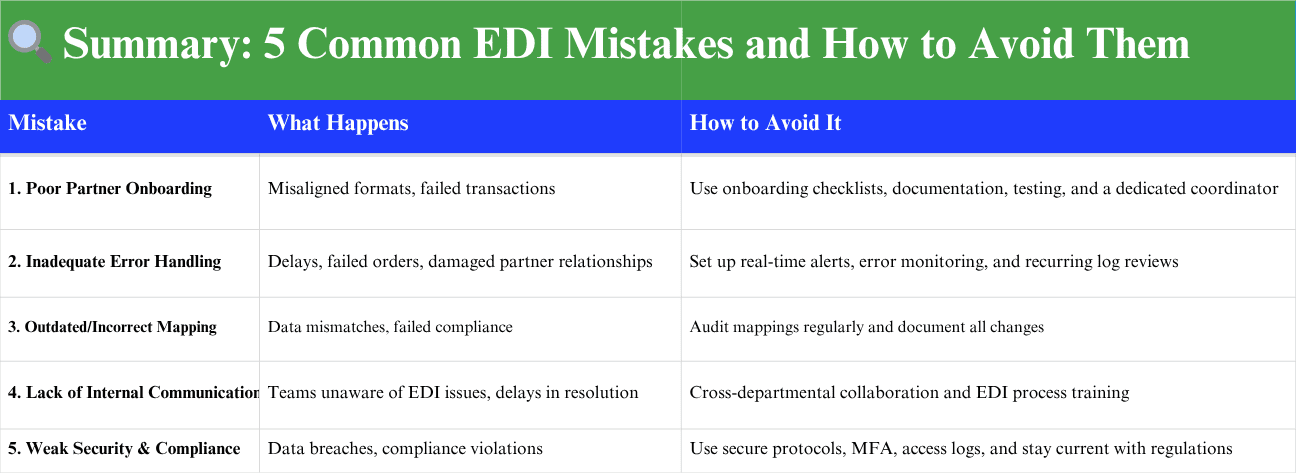Avoid costly disruptions and ensure smooth supply chain operations with these EDI best practices.
In today’s fast-paced, digitally connected supply chains, Electronic Data Interchange (EDI) is no longer optional—it’s essential. By automating the exchange of purchase orders, invoices, shipping notices, and other documents, EDI helps businesses reduce manual work, eliminate errors, and accelerate operations.
However, even the most robust EDI systems can fall short if not implemented or managed correctly. Below, we break down five of the most common EDI mistakes businesses make—and how to avoid them to protect your bottom line and your trading relationships.
1. Poor Partner Onboarding
The Mistake:
Many businesses rush through the onboarding of trading partners, assuming EDI formats and processes will just work. But improper or incomplete onboarding can lead to mismatches, failed transmissions, and frustrated partners.
The Fix:
Create a structured onboarding process. This should include a clear checklist, shared documentation (like EDI specs and maps), and rigorous testing before going live. Assign a dedicated EDI coordinator or team to guide partners through the process.
✅ Tip: Host a partner onboarding toolkit online for easy access to your company’s EDI standards.
2. Inadequate Error Handling
The Mistake:
Errors in data exchange—like missing fields, incorrect pricing, or duplicate orders—are inevitable. But not having a system in place to catch and resolve these issues in real time leads to delays, costly chargebacks, and lost trust.
The Fix:
Use automated monitoring tools that provide real-time alerts when an error occurs. Schedule regular reviews of EDI transaction logs and integrate exception handling rules into your workflow so errors are flagged and corrected quickly.
m.✅ Tip: Don’t just rely on alerts—assign clear ownership for EDI error resolution within your team.
3. Outdated or Incorrect Mapping
The Mistake:
EDI mapping is what translates your data format to your partner’s format. Even minor mapping errors (or outdated mappings) can derail transactions. This often happens when formats change but the map isn’t updated or versioned properly.
The Fix:
Maintain documentation for every map you use and perform mapping audits regularly—especially after updates to ERP, WMS, or partner systems. Use version control for map updates to roll back changes if something breaks.
✅ Tip: Use EDI mapping tools that offer visual interfaces and test environments to prevent production issues.
4. Lack of Internal Communication
The Mistake:
EDI may sit within IT, but the consequences of a failed transaction often hit finance, sales, or logistics first. Without internal communication, teams may not even be aware of an EDI issue until it’s too late.
The Fix:
Involve multiple departments in EDI training and planning. Regularly review EDI performance in cross-functional meetings, and create an internal escalation workflow for resolving partner issues quickly.
✅ Tip: Build an internal knowledge base so all teams understand how EDI works and where to report problems.
5. Weak Security & Compliance Practices
The Mistake:
EDI handles sensitive business data—yet many businesses neglect to secure it properly. This includes weak passwords, unsecured FTP protocols, and failure to meet industry compliance standards.
The Fix:
Encrypt all EDI transmissions and use secure communication protocols (like AS2 or SFTP). Enable multi-factor authentication, maintain access logs, and restrict user access by role. Stay up to date with regulations like GDPR, HIPAA, or PCI-DSS depending on your industry.
✅ Tip: Conduct regular EDI security audits to stay compliant and prevent data breaches.

✅ Remember: A strong EDI strategy isn’t just about automation—it’s about accuracy, communication, security, and long-term alignment with your partners.
Final Thoughts
The success of your EDI program relies on more than just software—it requires proper processes, cross-functional alignment, and continuous monitoring. By proactively addressing these common EDI mistakes, your business can improve partner satisfaction, reduce costly errors, and unlock the full value of digital supply chain automation.
If you're ready to level up your EDI strategy or need help auditing your current process, our experts at Precision e-Business Group are here to help.




